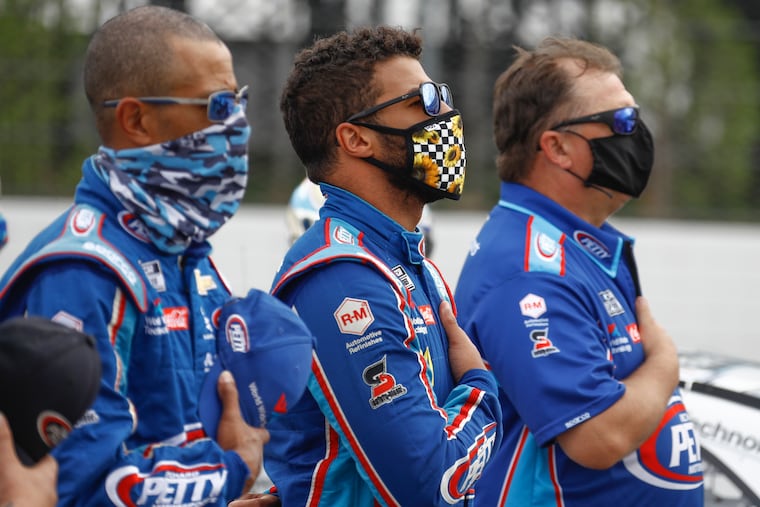The Pledge of Allegiance is a lie in Trump’s America | Solomon Jones
One need only look to Trump’s decision to target NASCAR driver Bubba Wallace, the only African American driver participating in the largely white, largely Southern sport.

I pledge allegiance to the flag of the United States of America. And to the republic for which it stands, one nation under God, indivisible …
Those words from the Pledge of Allegiance taught me what it meant to be an American, and as I proudly recited them daily, beginning in kindergarten, I didn’t question whether they were true.
As I grew older and gained an understanding of the meaning of race in America, I grew increasingly unsure about the pledge, especially its closing phrase:
With liberty and justice for all …
Today, however, I am no longer uncertain. As I watch President Donald Trump divide us over monuments to the Confederacy and white supremacy, I am thoroughly convinced that we are not one nation. Nor are we indivisible. Sadly, the Pledge of Allegiance is a lie.
One need only look to Trump’s decision to target NASCAR driver Bubba Wallace, the only African American driver participating in the largely white, largely Southern sport. Wallace requested that NASCAR ban Confederate flags and the sport acquiesced. Shortly after, a noose was found in Wallace’s NASCAR garage.
To their credit, the other NASCAR drivers stood with Wallace against the racism the noose represents. However, the FBI, after investigating, said the noose was there before Wallace was assigned to the garage. President Trump then took to Twitter, claiming that Wallace had engaged in a hoax.
“Has @BubbaWallace apologized to all of those great NASCAR drivers & officials who came to his aid, stood by his side, & were willing to sacrifice everything for him, only to find out that that whole thing was just another HOAX? That & Flag decision has caused lowest ratings EVER!”
In response, Wallace took to Twitter to push love over hate. But let’s be clear: Trump’s tweet was about more than a single Black race car driver. It was about stirring up Trump’s white conservative base by standing against a Black man. Perhaps most importantly, it was about Trump supporting a flag that is a symbol of rebellion against the very country Trump is supposed to be leading.
If the president of the United States can stand against NASCAR’s removal of the traitorous symbol that is the Confederate flag, I question whether he believes we are one nation. If the president can single out any American for mistreatment, I don’t think he believes we are under God. If the president’s followers can so easily be convinced that their countrymen are the enemy, I challenge the contention that we are indivisible.
Trump has proven this repeatedly by dividing us over racial, ethnic, and religious differences. He began his presidential campaign by characterizing Mexican immigrants as rapists and criminals, later promising that Mexico would pay for a wall to keep them out. He banned travel to America from mostly Muslim countries, thus pushing the stereotype that Muslims are terrorists. He targeted Colin Kaepernick and other Black NFL players who protested police brutality by kneeling during the national anthem, calling them sons of bitches who should be fired.
Given that the Pledge of Allegiance says we are a godly and indivisible nation, why is our leader engaging in godless and divisive rhetoric?
Perhaps it’s because the pledge was never meant to unite us.
Written in 1892 by an ordained Baptist minister named Francis Bellamy, the Pledge of Allegiance arrived at the height of a wave of immigration from Southern and Eastern Europe. It was penned as part of a celebration to celebrate the 400th anniversary of Italian explorer Christopher Columbus’ arrival in America. Ironically, historians believe the pledge was written, at least in part, to undergird white supremacy at a time when Southern and Eastern European immigrants, including Italians, were considered inferior to Northern Europeans.
Today, as I watch Trump use our differences to separate us, I think back to the divisive era when the Pledge of Allegiance was created, and I wonder if we will ever become the indivisible country it describes.
As I contemplate the answer, I am certain of this one thing: The answer will have to come not from Trump, but from all of us.